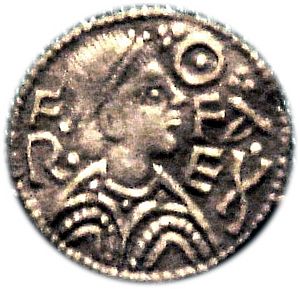Iclingas facts for kids
The Iclingas (say "Eye-cling-gas") were a powerful family of Kings of Mercia in England during the 600s and 700s. They are also known as the Iclings or the House of Icel. This royal family was named after a legendary figure called Icel or Icil. He was said to be a great-grandson of Offa of Angel, a famous leader from a time called the Migration Period. Old family records, known as Anglo-Saxon royal genealogies, even claimed that Icel was a descendant of the god Woden.
The Iclingas became very strong under Offa of Mercia, who ruled from 757 to 796. He became the most powerful ruler among the Anglo-Saxon kingdoms. Offa even called himself "King of the English." However, the Iclingas lost control of Mercia not long after Offa died.
Penda, who became king of Mercia around 626, was the first Iclinga king mentioned in old lists. He was also the last pagan king of Mercia. His family line provided at least eleven kings to the Mercian throne. Some later records said that four more kings were part of the Iclinga family through Penda's sister.
Contents
Who Were the Iclingas?
Icel, the person the family is named after, might have been a real person. Historians think he lived between 450 and 525. He was likely seen as the founder of the dynasty because he was the first of his family to come to Great Britain.
The Iclingas claimed to be connected to rulers and heroes from Angeln (a region in Germany) and to the war-god Woden. But before Penda became famous, historians believe the Iclingas were just one of many small ruling families in the Midlands of England. They probably controlled a small amount of land, about 300 to 600 hides (a hide was a measure of land).
Icel's Family Tree
According to old family traditions, Icel's ancestors were:
- Icel, son of Eomer
- Eomer, son of Angeltheow
- Angeltheow, son of Offa
- Offa, son of Wermund
- Wermund, son of Wihtlæg
- Wihtlæg, who was a son, grandson, or great-grandson of Woden.
In this tradition, Icel was the leader of the Angles who moved to Britain. After Icel, three generations passed before Mercia was established. Icel's son was Cnebba, whose son was Cynewald. Cynewald's son was Creoda, who became the first king of Mercia.
Early Mentions
An old book called the Vita Sancti Guthlaci ("Life of Saint Guthlac") mentions Guthlac of Crowland. It says he was the son of Penwalh, a Mercian who could trace his family line back to Icel.
Some places in England might have names that come from Icel or the Iclingas. These include Icklingham, Ickleford, Ickleton, and Ixworth. The name Iclinga also lives on in names like "Hickling."
Important Iclinga Kings of Mercia
Here are some of the Iclinga kings of Mercia who are known to have definitely ruled.
- Creoda of Mercia is not fully confirmed by history. If he was real, he would have lived in the late 500s.
- Cearl of Mercia, who ruled in the early 600s, was probably not an Iclinga.
| Ruler | Time as King | Important Facts | Died |
|---|---|---|---|
| Penda | around 626–655 | Son of Pybba. He made Mercia the strongest Anglo-Saxon kingdom. He was the last pagan ruler of Mercia. He died in battle fighting Oswiu. | November 15, 655 |
| Eowa | around 635–642 | Son of Pybba. He ruled alongside Penda. He died in battle. | August 5, 642 |
| Peada | around 653–656 | Son of Penda. He ruled parts of the south-east Midlands. He was murdered. | April 17, 656 |
| Wulfhere | 658–675 | Son of Penda. He brought Mercia back to power in England. He was the first Christian king of all Mercia. | 675 |
| Æthelred I | 675–704 | Son of Penda. He gave up his throne and went to live in a monastery at Bardney. | 716 |
| Cœnred | 704–709 | Son of Wulfhere. He also gave up his throne and went to Rome. | ? |
| Ceolred | 709–716 | Son of Æthelred I. He was likely poisoned. | 716 |
| Ceolwald | 716 | Thought to be the son of Æthelred I (he might not have existed). | 716 |
| Æthelbald | 716–757 | Grandson of Eowa. He declared himself King of Britain in 736. His bodyguards murdered him. | 757 |
| Offa | 757–796 | Great-great-grandson of Eowa. He was the greatest and most powerful Mercian king. He called himself King of the English in 774. He also built Offa's Dyke and created the silver penny. | July 26 or 29, 796 |
| Ecgfrith | 787–796 | Son of Offa. He ruled alongside his father. He died suddenly a few months after his father. | December 14 or 17, 796 |
Family Connections
This chart shows how the Iclinga kings were related.
| Pybba | |||||||||||||||||||||||||||||||||||||||||||||||||||||||||||||||
| Penda | Eowa | Coenwalh | |||||||||||||||||||||||||||||||||||||||||||||||||||||||||||||
| Peada | Wulfhere | Æthelred | Merewalh | Alweo | Osmod | Cundwalh | |||||||||||||||||||||||||||||||||||||||||||||||||||||||||
| Coenred | Ceolred | Ceolwald | Æthelbald | Eanulf | Centwine | ||||||||||||||||||||||||||||||||||||||||||||||||||||||||||
| Thingfrith | Cynreow | ||||||||||||||||||||||||||||||||||||||||||||||||||||||||||||||
| Offa | Bassa | ||||||||||||||||||||||||||||||||||||||||||||||||||||||||||||||
| Ecgfrith | Cuthberht | ||||||||||||||||||||||||||||||||||||||||||||||||||||||||||||||
| Coenwulf | Ceolwulf | ||||||||||||||||||||||||||||||||||||||||||||||||||||||||||||||
See also


